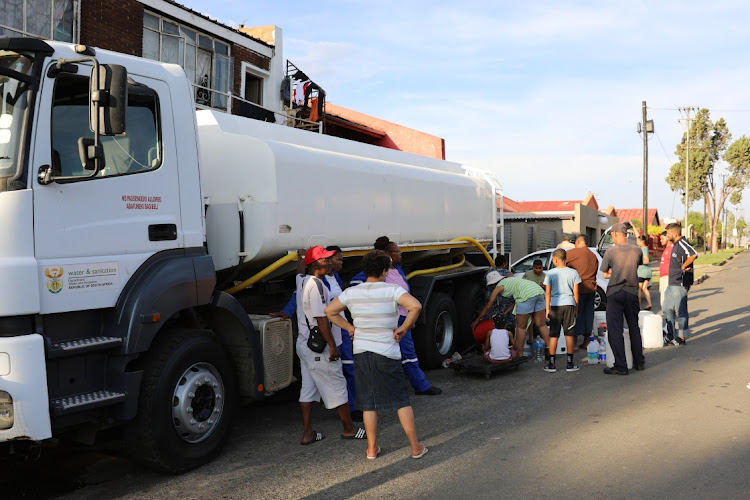The Township is the Frontline: Johannesburg’s Water Crisis Is by Design

In Johannesburg, taps run dry long before the state runs to help. In Soweto, Alexandra, Brixton, and Emfuleni, communities go days - sometimes weeks - without water. What’s worse? This has become normal. The Johannesburg High Court recently shut its doors because there was no water, a temporary shock in the heart of the city. But in townships, where the public’s pleas for accountability are routinely ignored, this crisis has been ongoing for over two decades.
We cannot call it an emergency. Emergencies trigger action. This? This is a design. The City of Johannesburg and Rand Water continue to cite “high consumption,” “load shedding,” and “aging infrastructure” as reasons for the crisis. But let’s be clear: no amount of PR spin can hide the rot. Reservoirs are collapsing. Pipes are bursting. Pumps fail because they’ve gone without maintenance for years. Water loss through leaks, theft, and infrastructure breakdowns has ballooned to 44%. That’s nearly half of the city’s supply vanishing into the dirt while residents queue at 3 a.m. for tankers in the winter cold.
This isn’t just about bad management. It’s about neglect by design. It’s the afterlife of apartheid spatial planning - where Black, poor communities were dumped on the periphery and are now expected to survive there without infrastructure, without investment, without dignity. Water has become a postcode privilege, and the townships are being asked to live without the very thing the Constitution calls a human right.
The Water Services Act and Section 27 of the Constitution affirm that every South African has the right to access sufficient water. But what does a right mean in a country where you must fight for it daily, with empty buckets and tired feet?
The mayor inspects the reservoirs, the president promises a working group, and the municipality mumbles about future plans and smart meters. Meanwhile, people are drinking from boreholes, washing with bucket water, and watching their children grow up in what feels like a post-apocalyptic experiment.
If this were happening in Sandton, we’d have helicopters dropping bottled water. But in the township, the crisis is invisible until it spills into the suburbs - then, suddenly, officials find microphones.
This is not just about infrastructure. It’s about power. It’s about who matters. For years, Emfuleni has been a national disgrace. R3 billion was lost in water, R636 million was returned unspent due to incompetence, and R562 million was blown on employee overtime. No water, but the bills still come. It’s not a lack of resources; it’s a lack of will. Corruption and mismanagement are not bugs in the system - they are the system. And they’re costing people their health, their safety, and their futures.
And yet, no one has been held accountable. No heads have rolled. No commissions of inquiry. Just the slow, grinding violence of a government that shrugs while its people thirst.
Young voices from these communities - the ones who live this crisis, carry it, fight it - are still locked out of policy spaces. Women still bear the weight of water collection, exposing themselves to danger just to clean or cook. This is gendered, racialised, and classed violence. It is climate injustice. It is a governance failure.
So what now?
We need more than outrage. We need interventions. First, Johannesburg and Emfuleni must be declared national water disaster zones. This would unlock emergency funding, deploy engineers, and demand clear delivery timelines - not just symbolic concern. Second, a Township Water Recovery Plan must be launched, with ring-fenced and transparent funding for infrastructure repair. This plan should be led by an independent body that includes community and youth representation, not just bureaucrats.
Third, criminal investigations must be opened, and prosecutions pursued against those responsible for gross negligence and wasteful expenditure. Water theft isn’t just a leaking tap - it’s the billions siphoned off through incompetence and corruption. Fourth, community trust must be rebuilt through local water justice forums, where residents don’t just complain, they co-govern.
Finally, investment is urgently needed in decentralized water solutions like rainwater harvesting, greywater recycling, and community purification systems - especially in schools, clinics, and informal settlements where the crisis hits hardest.
Because if we don’t act now, we are not just failing to protect a right - we are writing off a generation.
There is still time to turn this around, but only if we name the problem for what it is. Not a technical glitch. Not a temporary inconvenience. A betrayal.
South Africa cannot call itself a constitutional democracy while millions go without water. The township is the frontline - not because its people are weak, but because they are strong enough to endure what no one else should have to. But endurance is not a solution. Justice is.
We don’t need more speeches. We need restoration. We need dignity. We need water.
And we need it now.
Lebogang Khumalo co-leads the Kagisano Foundation Climate Change Campaign and is a final-year LLB student at the University of the Witwatersrand.
Get in Touch
We'd love to hear your thoughts and feedback!

